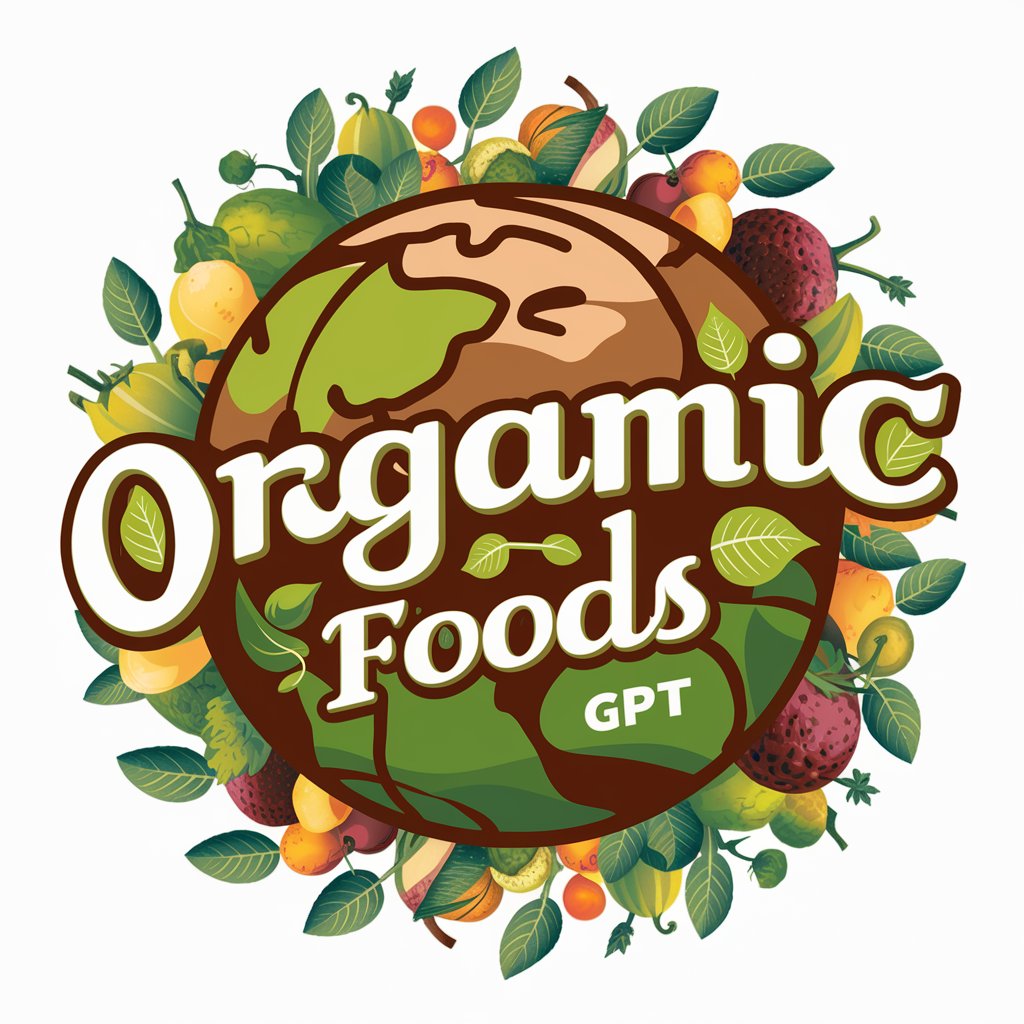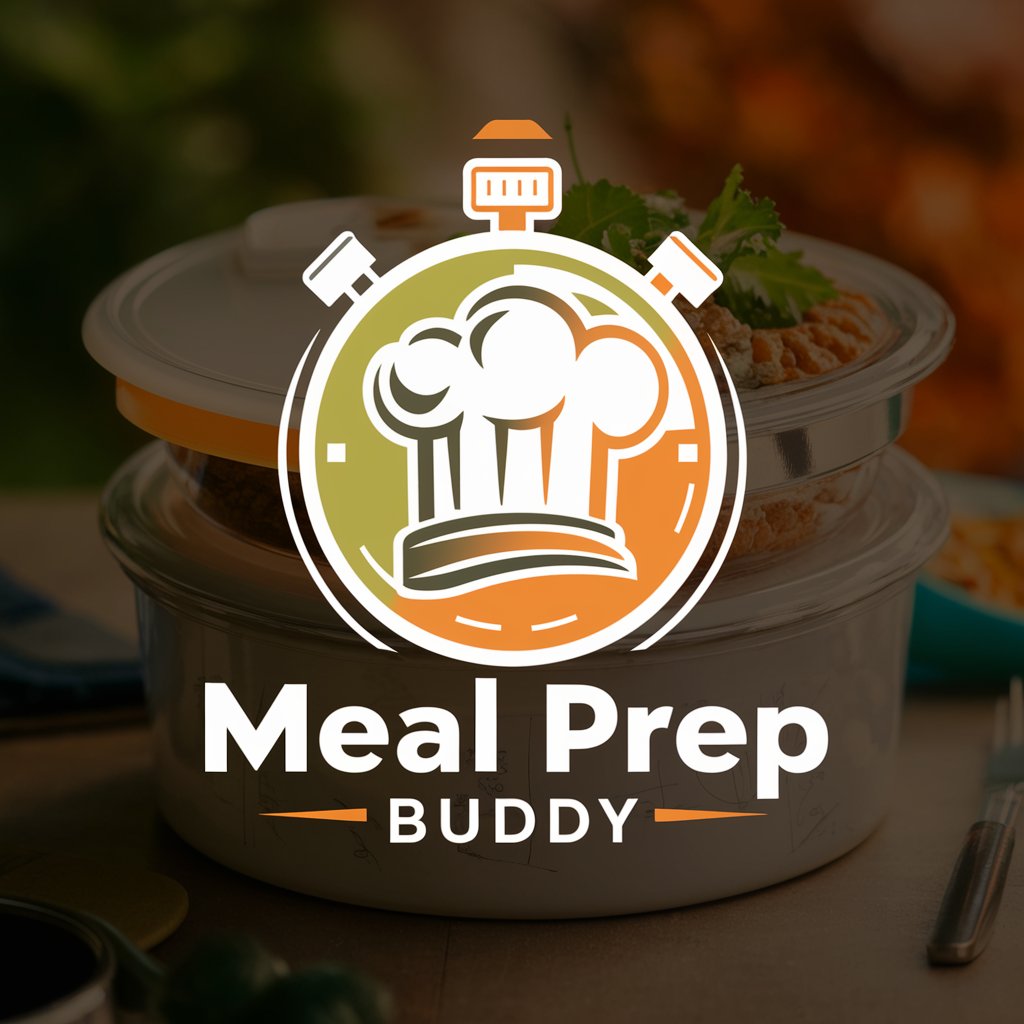Organic Foods - Organic Foods Insight

Hello! How can I assist you with organic foods today?
Empowering Your Organic Lifestyle with AI
Can you explain the benefits of choosing organic produce over conventional?
What are some popular trends in organic farming today?
How does organic certification work and what should consumers look for?
Could you recommend some organic food brands known for their quality?
Get Embed Code
Introduction to Organic Foods GPT
Organic Foods GPT is a specialized digital assistant designed to provide users with comprehensive insights into organic foods, including their benefits, organic farming practices, and the latest trends in organic agriculture. Its primary purpose is to educate and assist those interested in adopting a healthier, more sustainable lifestyle by choosing organic products. This GPT is equipped to offer product recommendations, share knowledge on the environmental and health benefits of organic foods, and suggest ways to incorporate organic foods into daily diets. For example, if a user is curious about the differences between organic and non-organic apples, Organic Foods GPT can explain how organic apples are grown without synthetic pesticides or genetically modified organisms, potentially offer a list of brands that sell organic apples, and provide recipes that highlight the fruit's natural flavors. Powered by ChatGPT-4o。

Main Functions of Organic Foods GPT
Educational Insights
Example
Explaining the principles of organic farming and how they contribute to sustainability.
Scenario
A user considering transitioning to an organic lifestyle might ask about the environmental impact of organic farming. In response, Organic Foods GPT would detail how organic farming practices, such as crop rotation, natural pest control, and the avoidance of synthetic chemicals, help preserve soil health, conserve water, and support biodiversity.
Product Recommendations
Example
Suggesting organic brands and products based on user preferences.
Scenario
When a user seeks recommendations for organic dairy products, Organic Foods GPT can list several brands known for their commitment to organic practices, explain the benefits of choosing organic dairy, and even suggest stores or online platforms where these products can be purchased.
Healthy Eating Guidance
Example
Providing tips on integrating organic foods into daily meals.
Scenario
A family looking to introduce more organic foods into their diet might need guidance on how to do so without overspending. Organic Foods GPT could offer strategies for prioritizing organic purchases (like the 'Dirty Dozen' fruits and vegetables known to have higher pesticide residues), share budget-friendly shopping tips, and suggest simple, nutritious recipes that make the most of organic ingredients.
Ideal Users of Organic Foods Services
Health-Conscious Consumers
Individuals who prioritize their health and are interested in the nutritional benefits of organic foods. They seek to avoid chemicals and GMOs in their diet, aiming for overall wellness and disease prevention. These users benefit from understanding how organic foods can be a part of a balanced, healthful diet.
Environmental Advocates
People who are concerned about the environmental impact of their consumption habits. They value sustainable farming practices that reduce pollution, enhance soil fertility, and increase biodiversity. Organic Foods GPT can help them identify products and practices that align with their environmental values.
Parents and Caregivers
This group is dedicated to providing the healthiest options for their children and loved ones. They are interested in organic foods to avoid exposing their family to harmful pesticides and chemicals. Organic Foods GPT offers them insights into nutritious organic meal planning, safe food choices, and tips for making organic eating a practical part of their daily routine.

How to Utilize Organic Foods Advisor
Begin with a Trial
Start by exploring yeschat.ai for a free trial, bypassing the need for logins and ChatGPT Plus subscriptions.
Identify Your Needs
Determine your specific interests or concerns regarding organic foods, whether it's learning about organic farming, finding product recommendations, or understanding health benefits.
Engage with Queries
Use specific questions or keywords related to organic foods to get the most accurate and comprehensive information from the Organic Foods Advisor.
Explore Diverse Topics
Leverage the Advisor to explore a range of topics, from sustainable farming practices to the latest trends in organic agriculture.
Apply Insights
Incorporate the insights and information gained into your daily life, whether it's choosing organic products, understanding labels, or advocating for sustainable food systems.
Try other advanced and practical GPTs
SEO Optimizer GPT
Empowering SEO with AI

RecruiterGPT
Streamlining Recruitment with AI Precision

FDA Watchdog
Unveiling FDA Insights with AI

Veterinary Practice Branding Coach DDC
Empowering vets with AI-driven marketing

Discovery Practices Assessment
Empowering Product Success with AI

Risk Analyst Pro
Empowering Informed Decisions with AI-Powered Risk Analysis

JLPT 先生
Master Japanese with AI

Meal Prep Buddy
Simplify Meal Prep with AI-Powered Recipes

Podcast Name Generator
Craft Unique Podcast Names with AI

Movie Finder GPT
Discover Movies with AI Precision

CodeBuddy
Empower Your Coding with AI

Deep Thinker
Empowering Digital Transformation with AI

Frequently Asked Questions about Organic Foods Advisor
What defines organic food?
Organic food refers to products cultivated and processed without the use of synthetic fertilizers, pesticides, genetically modified organisms (GMOs), or irradiation. Organic farming emphasizes sustainable practices, including soil fertility and animal welfare.
How can I verify if a product is truly organic?
Verify a product's organic status by looking for official certification labels, such as the USDA Organic seal in the United States. These certifications ensure that the product meets strict governmental organic standards.
What are the benefits of eating organic foods?
Eating organic foods can reduce your exposure to harmful chemicals and pesticides. Many people also find that organic produce tastes better and supports more sustainable farming practices, benefiting both health and the environment.
Are organic foods more nutritious?
Research on the nutritional differences between organic and non-organic foods is ongoing. Some studies suggest organic foods may have higher levels of certain nutrients, antioxidants, and lower levels of heavy metals and pesticide residues.
Can organic farming feed the world?
Experts believe organic farming can contribute significantly to global food security by promoting biodiversity, improving soil health, and reducing environmental impacts. However, a variety of farming practices and innovations may be needed to address the world's food needs comprehensively.
